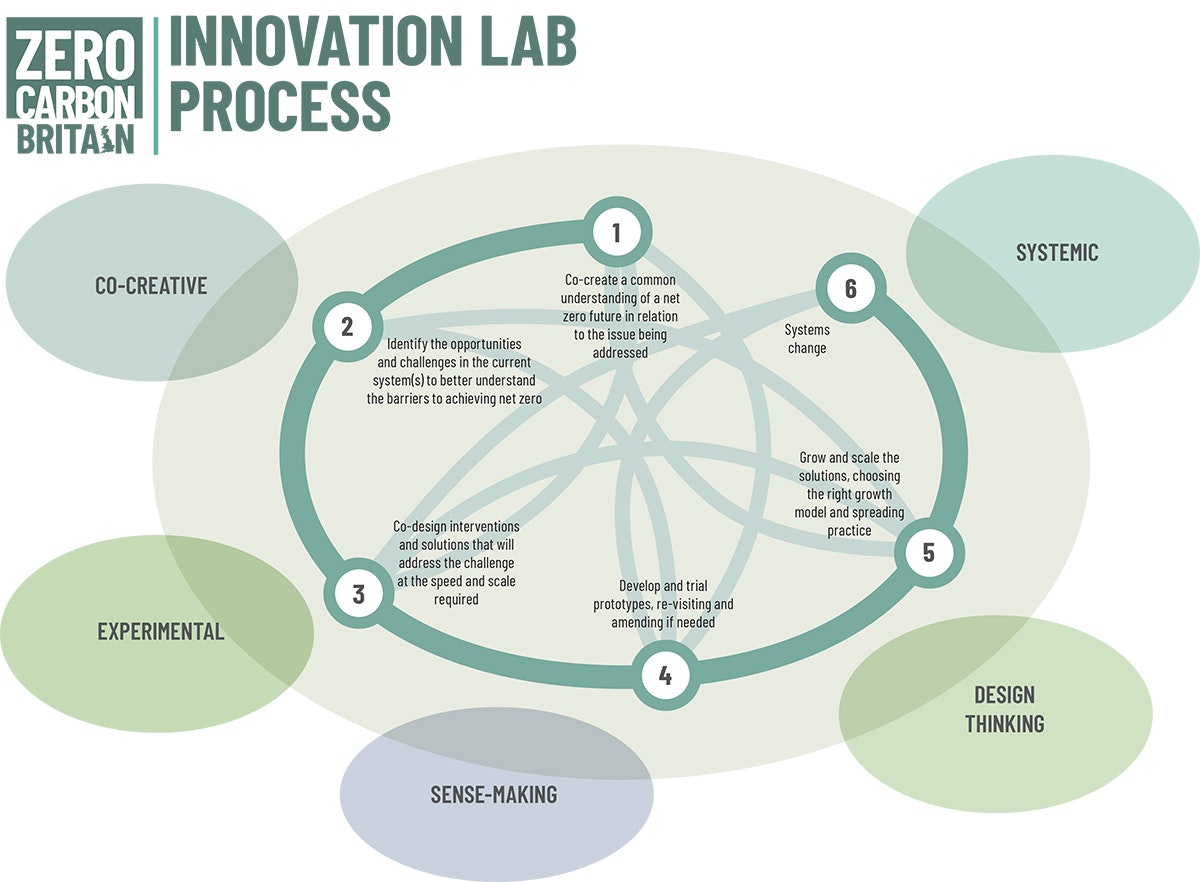
Complex problems like climate change require us to work together to understand the challenges and to design effective solutions. Dr Anna Bullen introduces CAT’s new Zero Carbon Britain Innovation Lab, aimed at exploring and sharing routes into systemic change.
As we know, climate change is a complex problem, the implications of which affect everyone, albeit to different degrees. Such complex problems, which include multiple stakeholders with intertwining and often contradictory interests, are often called ‘wicked’ problems. Whilst they present multiple possible approaches, there is no obvious single root cause or solution. In other words, wicked problems, such as climate change, are everyone’s problems – they are no single individual or organisation’s responsibility and require multiple stakeholders* to address them effectively.
In order to tackle complex problems like climate change in the current economic climate we have no choice but to innovate. We need solutions that work across a complex range of interacting areas; solutions that not only offer technical fixes but also help overcome political, cultural, economic and psychological barriers. Yet too often approaches to innovation are ineffective and do not lead to the rapid systems change that is required if we are to avoid catastrophic climate change.
An innovation lab offers a viable tool to both design and implement the solutions needed to face this complex challenge.
Experimentation and participation
Innovation labs take a variety of forms, but essentially use experimental and participatory methods to tackle complex issues or challenges.
Central to an innovation lab process is ‘design thinking’, which is used to understand a particular issue and its impacts, and in turn design solutions to the challenge.
In addition to this, innovation labs are co-creative, experimental, sense-making and systemic in their nature. They involve an iterative process that seeks to understand the participants (stakeholders), challenge assumptions and redefine problems before co-designing, prototyping and implementing solutions to those problems.

Exploring challenges and solutions – together
Design thinking provides a user-centric approach to solving problems, developing an understanding of the people for whom a product, policy or service is being designed. It focuses on human beings from the outset, so instead of viewing problems solely from an organisation’s resource perspective or the system’s perspective, we view them through an experience perspective, i.e. how the problem is perceived or experienced by the stakeholders.
Co-creation is a creative collaboration between diverse stakeholders to define, clarify, create and realise visions that provide value in a deeper sense. It draws on a range of perspectives and ideas in order to inform the process, and ultimately design and create the ‘product’. It blends these ideas to create new ideas, exploring both the existing challenges and the potential solutions. The participation and collaboration of diverse stakeholders beyond consultation, as opposed to teams of experts or technocrats, represents the social nature of labs; the greater the diversity, the greater the potential for innovation.
Whilst design thinking and co-creation differ slightly (design thinking contributes to create value through in-depth user observation; co-creation methods are aimed at creating value through user interaction), both are user-centred, aimed at creating value through experience and fostering innovations.
Innovation labs are experimental; we take an iterative approach to the challenges we are addressing by prototyping interventions then reviewing and amending them until we get it right. We expect failure along the way, in the full knowledge that we learn as much from failure as we do from success.
The innovation lab process is sense-making; we support participants to come together to understand what’s happening and why. We encourage participants to let go of preconceived ideas about the problems that exist and the best solution(s) to them. This not only builds the sense that change is necessary, but creates an openness to novel responses and approaches.
Finally, innovation labs are systemic. The ideas and initiatives developed in social labs, released as prototypes, go beyond dealing with a part of the whole, or symptoms, and address the root cause of why things are not working in the first place.
The Zero Carbon Britain Innovation Lab
CAT’s Zero Carbon Britain Innovation Lab aims to:
- Develop greater understanding of current barriers to net zero;
- Co-design innovative measures to address those barriers;
- Identify mechanisms through which those measures can be prototyped;
- Implement and monitor prototyping of the solutions;
- Create routes into larger scale impact or systems change.
Typically, our labs will use participatory tools and methods to enable the participants to work together to: explore the current situation (system) and its barriers to addressing the climate emergency; develop a vision of where they want to get to (e.g. net zero); and identify opportunities that will enable their journey to that vision.
From that process we co-design interventions and solutions that can be prototyped within the current situation. We support the participants to evaluate those solutions and where necessary revisit them to adjust accordingly.
Where needed, we can draw on our training offer to support the participants in developing the additional skills and knowledge required for implementation.
All solutions and interventions that are developed will be shared widely, supporting other organisations to adapt and implement them, avoiding duplication and unnecessary use of resources. Our online hub will share outputs from the lab and our training will support organisations to understand and implement the solutions. Finally, reports on the findings from each Lab process will also be shared with policy makers. We will work with others to engage the political community to inspire and influence policy making at multiple levels, from local councils to national governments.
In this way, our innovation labs have the potential to make a significant contribution to the rolling out of effective solutions at the speed and scale required to address the climate emergency.
Upcoming Labs
We plan to run a variety of labs, addressing different barriers and ensuring best use of our funding. We have lots of ideas in the pipeline, including the following:
A land use lab
Our land provides the food that feeds us, fibre for a variety of purposes, and is central to the livelihoods of many social groups, particularly in rural areas. In addition, it provides a multitude of ecosystem services vital to human well-being and provides crucial opportunities in relation to carbon offsetting and capture. As such, it is a critical resource for food security and sustainable development and must play a central role in our journey to net zero.
The UK cannot reach net zero without significant changes to how we manage our land. Agriculture, forestry and other land use is responsible for just under a quarter of anthropogenic greenhouse gas emissions, primarily from deforestation and agricultural emissions (livestock, soil and nutrient management), whilst agricultural food production alone is responsible for just under 10% of total UK greenhouse gas emissions.
Historically, agriculture, forestry and other land use have often been dealt with separately, but this is now changing, most notably in the IPCC Fifth Assessment Report, when the vast majority of the terrestrial land surface, comprising agriculture, forestry and land use were considered together in a single chapter.
The land use innovation lab plans to bring together representatives from all of the land use sectors to explore existing barriers to reaching net zero and to co-design solutions.
A business innovation lab
We are working with the Shropshire Climate Action Partnership (SCAP) Enterprise Group to understand the barriers that businesses face in addressing the climate emergency and how best to engage them in the journey to net zero.
We supported SCAP both through providing training for them and then in the development of their climate action plan, which is based on CAT’s Zero Carbon Britain research, and are now working with them on this particular element.
We will run an innovation lab process with the Enterprise Group and a sample of businesses to identify and understand the barriers to addressing the climate emergency, to explore the co-benefits for businesses that arise from addressing the climate emergency, and to design an effective process by which the Enterprise Group can engage businesses across Shropshire in delivering on their climate action plan.
* In this context, we define a stakeholder as any individual or organisation with an interest in (e.g. may be impacted by) and/or influence on, the issue (it might be a decision, policy or process) and its outcomes.
About the author
Anna is CAT’s Zero Carbon Britain Innovation Lab Manager. She is an experienced and qualified facilitator and project manager, with 25 years’ experience in the sustainability sector, and is a firm believer in the use of co-creation methods in order to design effective and meaningful solutions to issues such as climate change. She has a PhD in Sustainable Citizenship.
- Zero Carbon Britain
- News Feed
Related Topics
Related Pages
Email sign up
Keep up to date with all the latest activities, events and online resources by signing up to our emails and following us on social media. And if you'd like to get involved and support our work, we'd love to welcome you as a CAT member.



